Multicellular eukaryotes - Study guides, Class notes & Summaries
Looking for the best study guides, study notes and summaries about Multicellular eukaryotes? On this page you'll find 978 study documents about Multicellular eukaryotes.
Page 2 out of 978 results
Sort by
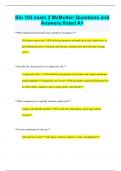 Popular
Popular
-
Bio 103 exam 2 McMullen Questions and Answers Rated A+
- Exam (elaborations) • 12 pages • 2024 Popular
-
- $9.99
- 1x sold
- + learn more
Bio 103 exam 2 McMullen Questions and Answers Rated A+ **What fundamental principles does cell theory encompass?** Cell theory asserts that ** all living organisms are made up of cells, which serve as the fundamental units of structure and function, and that cells arise from pre-existing cells**. **Describe the characteristics of a eukaryotic cell.** A eukaryotic cell is ** defined by the presence of a nucleus and various membrane- bound organelles**. Eukaryotes can exist as ** u...
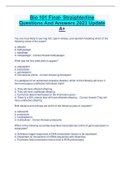
-
Bio 101 Final- Straighterline Questions And Answers 2023 Update A+
- Exam (elaborations) • 24 pages • 2023
- Available in package deal
-
- $11.49
- 2x sold
- + learn more
Bio 101 Final- Straighterline Questions And Answers 2023 Update A+ You are most likely to see hag fish, sperm whales, and viperfish inhabiting which of the following zones of the ocean? a. abyssal b. bathypelagic c. epipelagic d. mesopelagic - Correct Answer-bathypelagic What was the first seed plant to appear? a. angiosperm b. bryophytes c. gymnosperm d. nonvascular plants - Correct Answer-gymnosperm In a pedigree for an autosomal recessive disorder, which of the following will o...
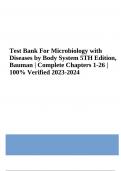
-
Test Bank For Microbiology with Diseases by Body System 5TH Edition, Bauman | Complete Chapters 1-26 | 100% Verified 2023-2024
- Exam (elaborations) • 481 pages • 2023
-
- $35.49
- 2x sold
- + learn more
Test Bank For Microbiology with Diseases by Body System 5TH Edition, Bauman | Complete Chapters 1-26 | 100% Verified 2023-2024. Chapter 1 A Brief History of Microbiology 2 Chapter 2 The Chemistry of Microbiology 19 Chapter 3 Cell Structure and Function 38 Chapter 4 Microscopy, Staining, and Classification 60 Chapter 5 Microbial Metabolism 80 Chapter 6 Microbial Nutrition and Growth 99 Chapter 7 Microbial Genetics 118 Chapter 8 Recombinant DNA Technology 137 Chapter 9 Controlling Microbia...
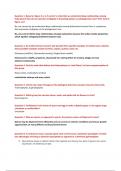
-
BIS 2C Pre-Lab 4 (Graded A+)
- Exam (elaborations) • 3 pages • 2023
- Available in package deal
-
- $8.99
- 1x sold
- + learn more
Question 1. Based on figure 4.1, is it correct to state that we understand deep relationships among Eukaryotes? How do we represent ambiguity in branching pattern on phylogenetic trees? Hint: look at figure 1.27. No, we cannot say we understand deep relationships among Eukaryotes because there is a polytomy that represents ambiguity on the phylogenetic tree. No, you cannot define deep relationships amongst eukaryotes because the nodes include polytomies which signifies ambiguity/indefinite...
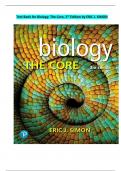
-
Biology: The Core 3rd Edition Exam Questions and 100% Correct Answers| Eric J. Simon
- Exam (elaborations) • 110 pages • 2023
- Available in package deal
-
- $17.99
- 3x sold
- + learn more
***Download Test Bank Immediately After the Purchase. Just in case you have trouble downloading, kindly message me, and I will send it to you via Google Doc or email. Thank you*** Biology: The Core 3rd Edition Exam Questions and 100% Correct Answers| Eric J. Simon The Test Bank for Biology: The Core, 3rd Edition by Eric J. Simon is a comprehensive study tool designed to aid in the understanding of fundamental concepts in biology. It contains a series of questions and answers that align with th...
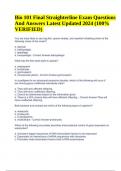
-
BIO 101 Straighterline Final Exam Questions And Answers Latest Updated 2024 (100% VERIFIED)
- Exam (elaborations) • 24 pages • 2024
- Available in package deal
-
- $18.49
- 1x sold
- + learn more
BIO 101 Straighterline Final Exam Questions And Answers Latest Updated 2024 (100% VERIFIED) You are most likely to see hag fish, sperm whales, and viperfish inhabiting which of the following zones of the ocean? a. abyssal b. bathypelagic c. epipelagic d. mesopelagic - Correct Answer-bathypelagic What was the first seed plant to appear? a. angiosperm b. bryophytes c. gymnosperm d. nonvascular plants - Correct Answer-gymnosperm In a pedigree for an autosomal recessive disorder, which of...
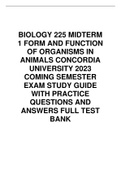
-
BIOLOGY 225 MIDTERM 1 FORM AND FUNCTION OF ORGANISMS IN ANIMALS CONCORDIA UNIVERSITY 2023 COMING SEMESTER EXAM STUDY GUIDE WITH PRACTICE QUESTIONS AND ANSWERS FULL TEST BANK
- Exam (elaborations) • 84 pages • 2023
-
- $12.99
- 1x sold
- + learn more
Textbook Readings Chapter _ 32 Animal Diversity Animals are multicellular, heterotrophic eukaryotes with tissues that develop from embryonic layers Animals are a diverse monophyletic group with 34 major animal phyla About 1.3 million species of animals living Three characteristics define the entire group 1. Mode of nutrition 2. Cell structure and specialization 3. Reproduction and development Nutritional Monde Animals are heterotrophs They cannot construct all their own or...
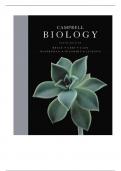
-
Test bank Campbell Biology (11th Revised Edition) Textbook
- Exam (elaborations) • 1244 pages • 2023
-
- $7.09
- 4x sold
- + learn more
Campbell Biology, 11e (Urry) Chapter 1 Evolution, the Themes of Biology, and Scientific Inquiry 1.1 Multiple-Choice Questions 1) Cells are . A) only found in pairs, because single cells cannot exist independently B) limited in size to 200 and 500 micrometers in diameter C) characteristic of eukaryotic but not prokaryotic organisms D) characteristic of prokaryotic and eukaryotic organisms Answer: D Bloom's Taxonomy: Knowledge/Comprehension Section: 1.1 2) In comparison to eukaryot...
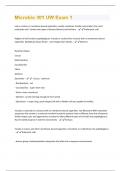
-
Microbio 301 UW Exam 1 Questions And Answers.
- Exam (elaborations) • 34 pages • 2024
- Available in package deal
-
- $11.49
- + learn more
Lack a nucleus or membrane bound organelles, usually unicellular. Smaller and simpler than most eukaryotic cells. Contain two types of domain Bacteria and Archaea. - Prokaryotic cells Ridged cell wall contains peptidoglycan. Includes a nucleoid (no nucleus) with no membrane-bound organelles. Multiply by binary fission - cell enlarges then divides - Bacteria Bacterial shapes: Coccus Rods (bacillus) Coccobacillus Vibrio Spirillum Spirochete - - Coccus - spherical - Rod (bacillus) - rod ...
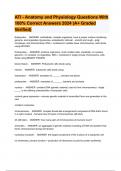
-
ATI - Anatomy and Physiology Questions With 100% Correct Answers 2024 (A+ Graded Verified)
- Exam (elaborations) • 31 pages • 2024
- Available in package deal
-
- $15.49
- + learn more
Eukaryotes - ANSWER multicellular, complex organisms, have a proper nucleus containing genome, and organelles (lysosomes, endoplasmic reticular - smooth and rough - golgi complexes, and mitochondria), DNA = contained in multiple linear chromosomes, cells divide using MITOSIS Prokaryotes - ANSWER primitive organisms, much smaller cells, unicellular, no nucleus, genome = in nucleoid, no organelles, DNA = contained in single circular chromosome, cells divide using BINARY FISSION binary fissi...

Did you know that on average a seller on Stuvia earns $82 per month selling study resources? Hmm, hint, hint. Discover all about earning on Stuvia


